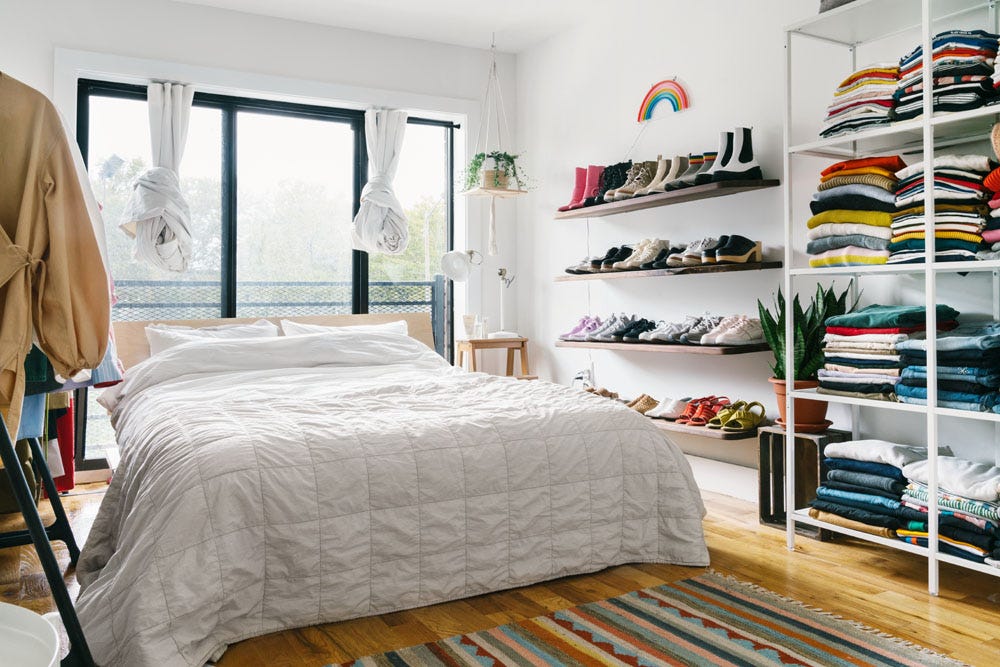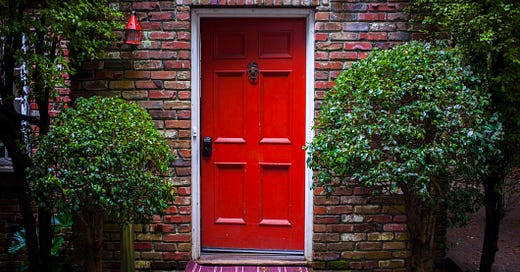Good morning!
Today’s newsletter is more of a provocation, so please weigh in! Comments are open, baby. I’m curious to hear what you think.
Why do we aspire to live alone?
A few weeks ago, a woman named Katherine called into my advice podcast to ask for tips on living alone. She’d just moved into her own place after living with a friend for years (which she’d loved) and now she was unnerved by the solitude. “I will be in my apartment, it will be nighttime, and I have no idea what to do with myself,” she said. She felt panicky about making the most of it—this hallmark of adult life that she may never experience again. While deciding whether to answer her question on air I thought of my own experience living alone, from May 2018 to May 2019, and realized, to my surprise, that I barely remembered it. This was weird, because I made a big deal about it at the time: putting off moving in with my boyfriend even though we were otherwise ready, telling him tearfully on a bench that I just couldn’t resist the call to “nurture my independent spirit.” My independent spirit! At the time I was proud of resisting the inertia of our romance—for taking a longer, more sober view of what I may one day regret (never living alone)—but of course I was just ceding to a different kind of romance.
There’s a sustained mythology around living alone in America, where personal achievement is foundational to our understanding of growth. Moving into your own place represents a kind of ascendance into adulthood, while the phrase “still living with roommates,” delivered in the right tone, is a dog whistle for childish or broke. When I was a precocious kid my mom used to joke that I was ready to move into an apartment by myself. I cherished that comment and built a personality around it. I strove for rugged independence and self-sufficiency—whatever I could do to prove I was “mature” even as a child. I think my desire to live by myself in my twenties was born of the same association. Having complete responsibility for and power over my domain seemed like the ultimate rite of passage into adulthood. I’d consumed plenty of media that reinforced the idea, too. Looking back, I don’t regret my choice to try it, but I wonder what I actually proved.

This line of questioning reminds me of the show Alone. If you’re not familiar, Alone is a reality show on The History Channel in which 10 trained survivalists are dropped in various remote places with tripods and video cameras and compete to see who can stay out there the longest. The prize is usually half a million dollars—stakes that seem particularly dark when you realize some contestants are enduring misery on TV for the chance to pay off their debts. The only thing keeping the show from going full Hunger Games is the respect it’s earned from the survivalist community as “the ultimate challenge.” Participants often seem just as eager to prove something to themselves and each other as they are to win the money. But midway through each season, when people start breaking down, longing for their families, I’m reminded that the actual challenge of the show (as its title suggests) is how to survive without other people. Of course, it’s also about making do without modern conveniences, but I’m always surprised by how many people give up because they’re lonely before they give up because they’re hungry or cold.
Humans are social creatures—cooperative and interdependent almost by biological definition. So if it’s not actually natural to our species to be self-sufficient, why is it considered aspirational? In the context of Alone, I see the appeal: Contestants often say they’re eager to get back in touch with their ancestors who lived off the land. And it’s genuinely inspiring to witness the peace some of them experience when respecting and communing with nature, feeding and housing themselves without all the horrifying externalities of those pursuits in modern society. I’m obsessed with their shelters, their unlikely tools, their encyclopedic knowledge of medicinal plants. But when they fail to keep it up for months and begin to despair, it’s not really a modern failure. Our ancestors couldn’t do it alone, either.
When I brought up the show on my podcast in response to Katherine’s question, my cohost Danny said it like this: “The way that you’re living on that show is like a different animal.” I wonder if you could say the same about living alone in any scenario. It’s not that there’s nothing wonderful—or challenging, in an interesting way—about making and cultivating an isolated living space. But it’s definitely a less natural way of being, at least if you’re taking human history into account. That we’ve come to see it as admirable says a lot about our culture: our commitment to individualism, our emphasis on personal wealth. Today, a person’s ability to live alone is usually an indicator of their financial position, so when we equate living with roommates as a signpost for arrested development, what we really mean is you can’t grow up without making more money. But I wonder what it would look like for financial or personal growth to lead to different, better kinds of communal living instead of an exit from it altogether. Living with roommates doesn’t have to mean living like a college student. You could argue that learning to live well with others is a more useful and applicable skill than learning to live well by yourself, but maybe that’s too prescriptive.
There are infinite variables that play into how and where we choose to live. Watching some of my friends move into their own places and love it has been genuinely sweet to watch. But I think there’s room to reinterpret our shared understanding of how people’s living arrangements should progress. Rather than an important rite of passage, maybe living alone is just one experience of many that can shape a person. By emphasizing it—not just individuals living on their own, but individual, nuclear families, too—I wonder what kind of society we’re aiming to create. How we live affects everything: how we support ourselves, how we use land and resources, how we retire. As my friends and I get older, we talk more and more about living together in a more communal arrangement, dreaming about what it could look like to share our lives (and burdens) in a more tangible way. Maybe it’s just a fantasy, but it’s not lost on me how many people entertain it.
What do you think? I’m turning on comments today because I think this topic makes for a better discussion than an essay, especially since I’m still working out my thoughts on it. Do you see living alone as a rite of passage? Do you also dream of living on a commune? (Lol.) What’s your living situation now and how’s it working out for you? I’ll be hanging around to contribute, too.
(If you click that button it will take you to the comment section, whether you decide to join in or not.)
My favorite article I read last week was “The Remarkable Brain of a Carpet Cleaner Who Speaks 24 Languages,” by Jessica Contrera for The Washington Post. (I cried at the end…). Last Friday’s 15 things also included an authentic Norwegian sweater, my favorite movie in recent memory, two entertaining interviews, and more. The rec of the week was dinner party hosting tips, many of which I used last night, so thank you!!
Hope you have a nice rest of your Sunday,
Haley





I think the most noteworthy part of living alone is the way it attunes you more sharply to your own thoughts (of course, taken to the extreme this can be a bad thing). There’s a quote by Claire Louise Bennett that comes to mind “in solitude, you don’t need to make an impression on the world, so the world has some opportunity to make an impression on you.” There’s a beauty in solitude I think, especially when a lot of modern life is engineered to distract us from ourselves and from thinking too deeply whilst conditioning us for a kind of performance. Being in the company of others is certainly vital for personal growth and development but I think we sometimes undervalue the power of being alone, without distraction from our own minds and patterns. It’s also interesting to discover how you are when you don’t (even unwittingly) alter your behaviour for someone else—your weird habits and proclivities. I don’t think it necessarily needs to be a rite of passage for everyone but it can certainly be an illuminating one that enhances your comfort with yourself. I often long for more spaces for community and I believe very much in interdependence but I don’t think living alone has to diminish those things, if anything it should make you seek them out more actively because they’re not built into your home life. From my perspective, so much of life is recognizing the inevitability of being alone to some degree—we are always alone in our heads, I think it’s worth getting comfortable there.
I would argue that gender plays a role in how you spin it. Women, as caretakers/overseers of domestic sphere have only relatively recently been given the cultural green light to live alone. For centuries, a woman lived with her family until she married or she went to a convent (yay! all-female communal living) or she drifted/opted into spinsterdom, and most likely due financial dependency reasons, lived with at least one family member. So while I totally hear you on the valorization of individualism etc., I think the aspiration to live alone (at least for women) can also be seen through the lens of social progress, and not just social fragmentation/dissolution. I would also point you to a "Room of One's Own" by Virginia Woolf :)